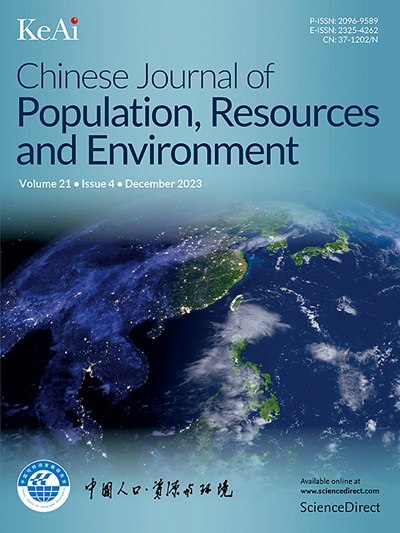Sustainable communal septic tank systems in informal settlements: The case of Lebak Siliwangi, Indonesia
IF 4.8
4区 环境科学与生态学
Q2 ENVIRONMENTAL STUDIES
Chinese Journal of Population Resources and Environment
Pub Date : 2025-03-01
DOI:10.1016/j.cjpre.2025.01.013
引用次数: 0
Abstract
This study focused on realizing Sustainable Development Goal (SDG) 6 for inclusive clean water and sanitation; in particular Target 6.3, which aims to reduce untreated wastewater by 2030 while promoting circular wastewater reuse and recycling globally. The main objective was to assess the adequacy and efficiency of communal septic tank systems in informal settlements while helping local planners and authorities in their decision-making regarding Target 6.3. Quantitative and qualitative approaches were employed with secondary data from previous researchers, and primary data were collected from field surveys, observations, and interviews with members of the local community. The research was delimited to two village administrative divisions known as Rukun Warga (Village Administrative Division, RW): RW 7 and RW 8 of Lebak Siliwangi Kampung in Coblong District, Bandung, West Java, Indonesia. The findings were also compared with situations in other informal settlements in Brazil, Bangladesh, and Nairobi. The results indicated the inadequacy of communal septic tanks in informal settlements due to factors such as substandard system design, limited support and communication between authorities and residents, and the gap between septic tank availability and capacity vis-a-vis demand. Other limiting factors included limited land availability and irregular geomorphology, the latter of which affected the siting and operation of septic tanks due a lack of room for upgrades or expansion in response to continuous population growth. These findings illustrate the need to complement communal septic systems with flexible centralized or decentralized systems to achieve Target 6.3 of SDG 6.
非正式住区的可持续公共化粪池系统:印度尼西亚Lebak Siliwangi的案例
本研究侧重于实现可持续发展目标(SDG) 6的包容性清洁水和卫生设施;特别是具体目标6.3,该目标旨在到2030年减少未经处理的废水,同时在全球促进废水循环再利用和再循环。主要目标是评估非正式住区公共化粪池系统的充分性和效率,同时帮助地方规划人员和当局就具体目标6.3作出决策。本研究采用定量和定性方法,从以前的研究人员那里获得辅助数据,并从实地调查、观察和对当地社区成员的访谈中收集主要数据。该研究被划分为两个村庄行政区划,称为Rukun Warga(村庄行政区划,RW):印度尼西亚西爪哇万隆Coblong区的Lebak Siliwangi Kampung的rw7和rw8。调查结果还与巴西、孟加拉国和内罗毕其他非正式定居点的情况进行了比较。结果表明,由于系统设计不合格、当局与居民之间的支持和沟通有限以及化粪池可用性和容量与需求之间的差距等因素,非正规住区的公共化粪池不足。其他限制因素包括有限的可用土地和不规则的地貌,后者影响了化粪池的选址和操作,因为由于人口不断增长,没有升级或扩建的空间。这些发现表明,需要用灵活的集中式或分散式系统补充公共化粪池系统,以实现可持续发展目标6的具体目标6.3。
本文章由计算机程序翻译,如有差异,请以英文原文为准。
求助全文
约1分钟内获得全文
求助全文
来源期刊

Chinese Journal of Population Resources and Environment
ENVIRONMENTAL STUDIES-
CiteScore
4.30
自引率
1.10%
发文量
791
审稿时长
79 days
期刊介绍:
The Chinese Journal of Population, Resources and Environment (CJPRE) is a peer-reviewed international academic journal that publishes original research in the fields of economic, population, resource, and environment studies as they relate to sustainable development. The journal aims to address and evaluate theoretical frameworks, capability building initiatives, strategic goals, ethical values, empirical research, methodologies, and techniques in the field. CJPRE began publication in 1992 and is sponsored by the Chinese Society for Sustainable Development (CSSD), the Research Center for Sustainable Development of Shandong Province, the Administrative Center for China's Agenda 21 (ACCA21), and Shandong Normal University. The Chinese title of the journal was inscribed by the former Chinese leader, Mr. Deng Xiaoping. Initially focused on China's advances in sustainable development, CJPRE now also highlights global developments from both developed and developing countries.
 求助内容:
求助内容: 应助结果提醒方式:
应助结果提醒方式:


